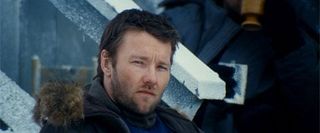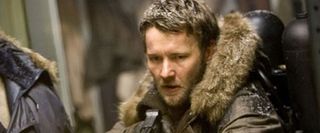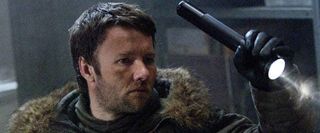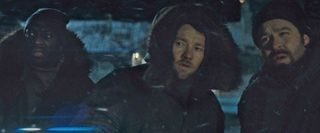Joel Edgerton Talks About Not Being Kurt Russell In The Thing

From Jack Burton to Snake Plissken, Kurt Russell and John Carpenter constructed some truly iconic roles together and R.J. MacReady in 1982’s The Thing is most definitely included. There’s been talk for years about a remake of Escape From New York, but the idea of someone else playing the Plissken role is unfathomable. But what if you’re not doing a remake, but rather a prequel and you’re making a character that isn’t ripped straight from the original? If you’re Joel Edgerton you just stop yourself from thinking about it.
I recently had the chance to speak with Edgerton on the phone about his role in Matthijs van Heijningen Jr.’ The Thing and spoke with him not only about dealing with the pressure of being a male lead in the film, but also feeling like a kid while making movies, wearing winter clothes in the midst of a humid summer and stepping into an iconic world. Check out the interview below.
What was it about the character that made you want to take this project on?
It really was a choice of my, kind of, interest in the original Carpenter movie. I didn't really say absolutely no to reading anything but, you know, horror movies, they're not really part of my agenda. But when I got this fine call about The Thing and once I determined that it was the Carpenter world of The Thing and not the Fantastic Four world I was like, I really want to read it, y'know, because I'm such a fan. And I read the script, and I liked the script, and I've been with the entire project. I think it's a really fantastic take on how to revisit that world without trying to redo it, without trying to remake it.
When you're taking on a new part, I'm wondering, what is your process? Perfect example, like right off the bat when we first meet Carter he talks about how he hasn't been able to watch basketball in a long time. Do you go from there and construct where he's been all this time?
Yeah, I think it's useful for the actor, in acting along with the director to determine the history of the character, regardless of whether the audience knows that or not. And with a movie like this you sort of nod to where a character has been without him doing all those “When I was a young man” kind of speeches. As a writer as well as an actor, I find that some of the most ridiculous parts of movies is when you stop the whole movie to have a “getting to know me” type of speech. Sometimes with a character it's really about letting them live through their actions rather than through any kind of exposition, and that can make it interesting. There's so many characters, so much action going on, that you've got really to be on the look out for how you portray the character. One of the things I like about the original movie and about movies like Alien, Ridley Scott's movie – these two movies are kind of in the same vein – is that you sort of get to know about the characters without actually getting to know that much about them. You don't know that much about their history, you know.

How much training did you have to go through, a perfect example being the flamethrower; did you actually get to operate a real one?
CINEMABLEND NEWSLETTER
Your Daily Blend of Entertainment News
Yeah we did… and it really electrifies the set when you've got a real prop like that. Because whenever a gun comes on set because whenever a gun comes on set or whenever a flamethrower comes on set, you're just reminded that it's pretty serious business. That was cool, the whole thing was cool to me, y'know, like being involved Star Wars. Like this world that's already being set up on film that I love so much and now I get to be a participant in that. Y'know and the moment they stuck the flamethrower on me I have a much better understanding of the original than I did before... I lived and breathed through movies as a kid. Because I lived in a small town that was one of the only things I could do to entertain myself, watch movies, pretend to be in movies, and make little movies on my own. And now that I'm all grown up it's a real privilege to be a part of that process, making movies for all the kids. The idea that there's some little kid growing up in a town like the one where I grew up in, watching movies that I'm in and getting inspired by that is pretty cool.
Do you still feel like a kid when you actually get to make movies?
Oh yeah, I mean don't get me wrong I can be grumpy, and I can be all of those things that an actor is. But, I mean, that's to say the last time I've been cool is me pretending to be cool, because I don't think I'm really that cool right now. But, you know, like when you try a costume for the first time, it's a little hard to contain your excitement or when you walk on set for the first time and see the scale of something that you've working with. Like when I first rolled up to Tatooine, the exterior of the Uncle Owen’s home on Tatooine, I come up the hill in a Land Cruiser and saw C-3PO coming up in the searing distance. And I was like, “Ah fuck.” I mean, somebody right now could see that I've never been this excited, y'know. Just being there, the excitement of making movies. Y'know, the other day I got to get on top of a horse and, we were doing some stuff for [The Great] Gatsby, just getting set. And I was like, “I’m Tom Buchanan and I’m sitting on top of a horse.” There's got to be excitement in it. There's a certain element of being a filmmaker or being an actor that takes away the magic of movies for you. But you kind of wipe it all away, all together.
On a similar note, you're doing The Thing you have so much tension, terror is lurking around every corner when you're performing. And I'm curious, after the director says “Cut”, does the atmosphere on the set kind of still have it lingering out in the air? Or is it just like a light switch that you can just turn off?
It all depends on the movie to me, and the scene within the movie. I mean, there's a certain moments in work for me when I still got to be really focused and zone everything else out, y'know avoid the kind of frivolity, I guess. And there are other times where you kind of create that frivolity or absurdity or levity, or whatever you want to call it, in order that the work on camera can keep the intensity. Because there's a tipping point where, certain times where, maintaining the edge can become so exhausting that it becomes detrimental to the work on screen. There’s so much waiting around on a film set, and then the choice is you have to find a quiet space to kind of just keep some kind of simmer going or keep some kind of meditation going. Or you engage with the human aspect of being on set, which is being around really great groups of really interesting people with great stories.

I know you guys were filming this movie in Toronto during the summer and I have to wonder, in those costumes, I mean you're dressed for an Antarctic winter, did you have to immediately get out of costume whenever you weren't needed on set? How uncomfortable was it?
There was real sweat going on. Personally I hate the cold, I hate extreme cold. “I think I'm kind of glad that we're shooting in a studio rather than on location in Yukon or Alaska or wherever.” By the time we were, uh, almost in the dead of summer, wearing warms suits and underclothing and all that, I was almost wishing we were in Alaska. [Laughs] I remember, I mean, this is how much I hate the freezing cold. I remember we were shooting King Arthur, we're on a mountain, and the cold was getting through my armor like you wouldn't believe and I was handed this envelope. It was snowing and they had snow machines, but we didn't need them because it was really snowing. And I opened up this envelope and it was a script, a script for a movie, and it said on the title page that it was shooting on location in Alaska. [Laughs] That script went straight in the bin! [Laughs] I'm kind of exaggerating, but you get the idea.
Carter is very much a different character from MacReady from the first film, but just by the nature of being a male lead in a movie based in The Thing world, it's obviously going to invite the comparison. So, I'm curious, being a different character is that something you can just block out and ignore? Or is it a part of the experience?
I don't know, Kurt Russell is Kurt Russell and MacReady is MacReady and Carter is someone else and I'm someone completely different. So, I mean, with the helicopter pilot, and I guess that part has made worried a little bit that people are going to expect that I would pretend to be Kurt Russell. In a way, I sort of stopped thinking about that and not bringing pressure on myself to feel any of that stuff. It happens a lot, y'know, like I was in a production of Streetcar Named Desire a couple years ago, and it almost seemed like the same thing would come up in conversation, like, “Are you watching Marlon Brando? Are you gonna try and do your own thing?” I said, I'm just gonna handle this my own way and, um, respect everything other peole have done, but I've just got to do my own thing and psychologically and physically handle it my own way, you know?

Does that extend to The Great Gatsby as well? Are you kind of doing your own take on Tom Buchanan or are you looking to anyone else?
The beauty of bringing a book to life is that you just go back to the book and you start there. That's the start of your journey, is the book. If I use Bruce Dern as my starting point, it's saying that Bruce Dern is more important than F. Scott Fitzgerald. Or that film that they made, saying that version is more important than F. Scott. So I really just have to go back to the page and the words and my discussions with Baz [Luhrmann] and my interactions with the other actors and and find their own source. Find their own spark, rather.
So is it basically a direct adaptation of the book? Like, there's nothing changed?
Uh, I can't really expand on that. I mean, look, all I will say is if you're filming The Great Gatsby you're filming The Great Gatsby. You know what I mean?
Sure.
I mean, it's that point where I don’t think Baz is trying to reinvent the wheel. It's more about actually seeing it. His way... you know Gatsby in space could be pretty cool.

Eric Eisenberg is the Assistant Managing Editor at CinemaBlend. After graduating Boston University and earning a bachelor’s degree in journalism, he took a part-time job as a staff writer for CinemaBlend, and after six months was offered the opportunity to move to Los Angeles and take on a newly created West Coast Editor position. Over a decade later, he's continuing to advance his interests and expertise. In addition to conducting filmmaker interviews and contributing to the news and feature content of the site, Eric also oversees the Movie Reviews section, writes the the weekend box office report (published Sundays), and is the site's resident Stephen King expert. He has two King-related columns.
Most Popular




